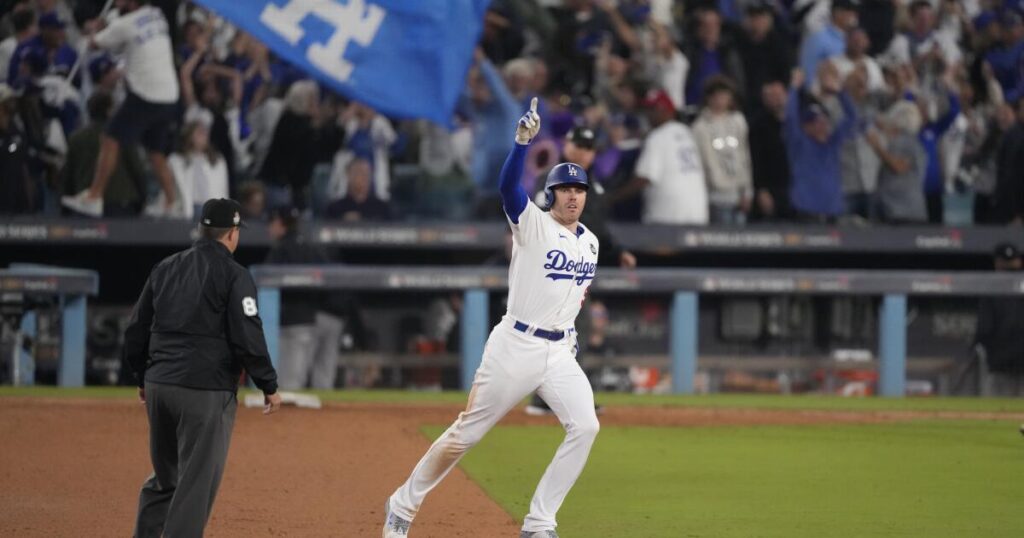The second step of virtually every 12-step recovery program states that “we came to believe that a power greater than ourselves could restore us to sanity.”
For one Dodgers fan, that “power” came in the form of first baseman Freddie Freeman, whose walk-off grand slam in the 10th inning of a World Series Game 1 victory over the New York Yankees last October provided an impetus for giving up alcohol.
“A guy was telling me at a luncheon” during last week’s Dodgers community tour “that he gave up drinking that night because he just wanted to be present with his kids,” Freeman, 35, said at Saturday’s fanfest event at Dodger Stadium.
“They were in the right-field stands, and he didn’t drink that whole game, and he hasn’t drank since because of how present he was with his kids. Those are the stories that give me chills. Those are the kinds of things sports can do.”
Freeman’s dramatic grand slam, one of four homers he hit to win most valuable player in the five-game World Series win over the Yankees, left an indelible mark on Dodgers fans, some literally.
Freeman said he ran into one fan in Orange County this winter “who had a fresh tattoo of me holding up my bat,” the iconic pose Freeman struck as he left the batter’s box and his grand slam soared into the right-center field seats. At Saturday’s fanfest, he signed the leg of a fan who had Freeman tattooed on the limb.
“You realize that sports means so much to people,” Freeman said. “When you’re out there playing and fans are going nuts, you feel that. But then when you come into personal contact with these fans, and they tell you how much it means to them, and then they show you how much it meant to them, it’s really cool.
“I think that’s so amazing that people would go through the pain to put me on their body.”
No Dodgers player endured more pain — physical and mental — during the team’s runup to the playoffs and World Series than Freeman.
The eight-time All-Star missed eight games in late July and early August while his 3-year-old son, Maximus, battled a life-threatening case of Guillain-Barré syndrome, a rare neurological condition in which the body’s immune system attacks the nerves.
Freeman suffered a severe right-ankle sprain in the last week of the regular season and needed hours of pregame treatments and multiple injections of pain-numbing medication to be able to take the field during the playoffs.
Freeman also revealed after the World Series that he played the entire month of October with broken costal cartilage in his sixth rib, an injury that was diagnosed two days before the postseason and typically sidelines players for months.
The rib-cage injury has healed, and Freeman said on Saturday that his son “is fine.” But the ankle injury was more problematic and will slow Freeman this spring.
Freeman, a 15-year veteran who is entering the fourth year of a six-year, $162-million contract, thought the ankle would improve with physical therapy and rest, and the tendons and ligaments in the joint did heal on their own.
But three weeks after the World Series, when Freeman was in Georgia for Thanksgiving, the swelling and discomfort in the ankle “wasn’t going away,” Freeman said. “I was like, ‘Something’s just not right.’ That’s when I text-messaged Thomas Albert, our head trainer, and said, ‘When I get home, let’s get this looked at.’”
A scan revealed a bone chip that had floated down to the Achilles tendon as well as several bone spurs. Freeman underwent surgery on Nov. 30 to remove the chip and shave down the spurs.
Eight weeks removed from surgery, Freeman swung a bat for the first time on Thursday. He will begin agility drills by the end of this week but said he won’t begin running until the Dodgers’ first full-squad spring training workout in Arizona on Feb. 15.
Freeman said he will be relegated to designated hitter for the first week or two of exhibition games, but the slugger is confident that he will be a full-go for the team’s March 18-19 regular-season opening series against the Chicago Cubs in Tokyo.
“I feel good,” Freeman said. “I’m on track.”
The surgery and rehab hardly put a damper on a celebratory three-month offseason for Freeman, whose November included his late-night debut on “Jimmy Kimmel Live,” an appearance as a presenter at the Country Music Awards in Nashville, and an interview with Travis and Jason Kelce on their New Heights podcast.
“It’s been crazy,” Freeman said. “We did a lot of celebrating when we got home after winning. It was fun. As I’m out and doing my stuff in the community, I don’t think I’ve made it through one outing without someone coming up [to congratulate me]. And that’s what’s so cool about this.
“When people are telling me what it meant to them, winning the World Series and that home run, it’s special. Obviously, a lot went into last year for me. A lot of speed bumps that we hit along the way. And to have it end like that, it was special.”
The 2024 season ended with a wild champagne-and-beer-soaked celebration in the visiting clubhouse at Yankee Stadium, but for one Dodgers fan, it began a quest for sobriety.
“Obviously, the rings and the championships, that’s what we’re going for, but to be able to impact lives like we were able to do in 2024, that’s why you play sports,” Freeman said. “You can change people’s lives and create memories.”
